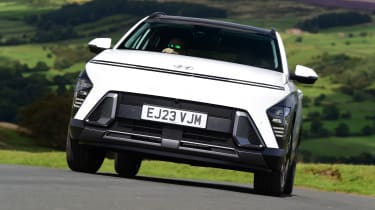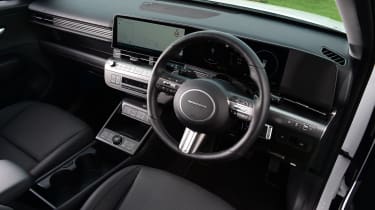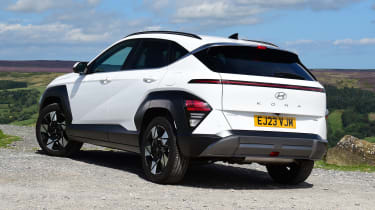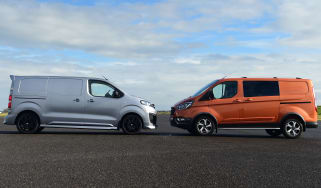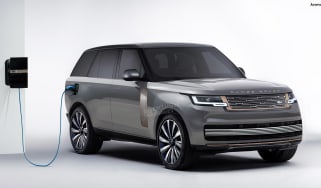New Hyundai Kona Hybrid 2023 review
The hybrid version of our Car of the Year is still a strong small SUV, but it falls slightly short of its all-electric sibling

Verdict
Our Car of the Year isn’t quite as accomplished in hybrid form as it is as a full-EV, but it’s still a very solid contender in the small SUV sector. Its physical growth in size compared with its predecessor means it’s now big enough to comfortably cover typical family-car duties, and it does so with generous equipment levels, plenty of comfort and superb efficiency – especially on short trips around town. This more affordable Kona is a great SUV.
The latest Hyundai Kona has proved to be a sure-fire hit – so much so that we proudly named it our Car of the Year for 2023 at our New Car Awards in July. It’s a superb all-round family car, and with a fully-electric powertrain it delivers fantastic range, strong performance and excellent refinement at a price that has surely raised the eyebrows of a few competitors.
Like the first-generation Kona, however, electric drive isn’t the only option with this second iteration of Hyundai’s popular compact SUV. The Korean brand is continuing to offer fully combustion-powered versions (there’s a choice of a 1.0-litre three-cylinder petrol unit and a 1.6-litre four-cylinder engine, both of which are turbocharged), plus the first step on the real electrificaton ladder with a full hybrid.
More reviews
For this model, petrol power is supplied by a 1.6-litre Atkinson cycle four-cylinder unit and is backed up by an electric motor, which produces 43bhp and 170Nm of torque. A modest 1.32kWh battery supplies this for all-electric running. Combined, the two power sources offer up 139bhp, which is sent to the front wheels via a six-speed automatic gearbox. That’s a very similar set-up to the existing car, but then as we know from our Driver Power satisfaction survey, owners had few complaints about that. In fact, Kona buyers had only one real criticism with the previous model: the cabin felt a little cramped.
Hyundai listened to this feedback, and the new model has grown as a result, providing more practicality. It’s 145mm longer than its predecessor, to be precise, a sizeable increase that’s big enough to make the cabin much more accommodating than before. In fact, it’s so spacious in the back now that knee and headroom are nearly at the same level as Hyundai’s larger Tucson family SUV. Its big brother is a little wider across the cabin, so it’s the better machine for carrying three people in the rear, but the difference isn’t much.
The Kona draws its styling inspiration from the larger Tucson too, with Hyundai’s now trademark parametric pixel lights at the front, joined by a slim, full-width light bar at the front on the Kona.
In profile the car features the same kind of sharp lines and solid surfaces as the Tucson, while a mimalist but big tailgate (again, with a full-width light bar) reveals plenty of boot space, which we’ll come to in a moment.
Inside, the dashboard takes inspiration from another Hyundai model, this time the Ioniq 5 EV. A 12.3-inch digital driver display sits beside a 10.25-inch touchscreen infotainment system, which look great and are fairly responsive to use. Hyundai has kept plenty of physical buttons, both for infotainment shortcuts and for the climate control system. Elsewhere, the airy cabin has plenty of storage space, though we’d like a couple more lidded cubbies to hide valuables out of sight.

Boot space in the new Kona is similarly impressive. At 466 litres, the load bay volume is great for a car in this segment, as is the 1,300-litre capacity when the seats are folded down.
On the road, the new model – specifically its hybrid powertrain – feels most at home around town and at lower speed. Here, the electric motor takes care of most of the driving on its own. When the small battery is depleted, the petrol motor smoothly wakes into life and hums away in the background, but go down a hill or even just coast for a little while, and the noise dies down as the car reverst back to electric drive. The paddles behind the steering wheel adjust the level of deceleration through motor regen in Eco mode, and in Sport they take control of the dual-clutch automatic gearbox.
Sport is an ambitious term for what the Kona’s hybrid powertrain delivers, however. Accelerate hard, and beyond the initial pep of the electric motor, the petrol unit trades not much more forward movement for a lot more noise. Officially, it’ll cover the 0-62mph dash in 11.2 seconds, but the acceleration tails off significantly beyond around 50mph. There’s still enough performance on offer on the motorway, however.
But driving keenly isn’t something that the Kona encourages you to do anyway – and nor was this part of its design brief – as the chassis is set up for comfort. The ride is relaxing at all speeds, and the handling is very safe and predictable, so it’s best to just take it easy, and reap the efficiency benefits of that hybrid tech.
Some journeys around town, where the electric motor is doing most of the legwork, saw us achieve more than 70mpg comfrotably – a very impressive result. At a 70mph cruise, that figure drops to a little over 50mpg, which is still reasonable, but it’s clear where the Kona’s strengths lie.
Equipment levels are excellent. All models come with LED headlights, lane-keep assist, adaptive cruise control, a 12.3-inch digital driver’s display, plus Apple CarPlay and Android Auto smartphone connectivity.
The sporty N Line S (there’s also a more affordable N Line model, which features the same looks but a little less kit) and top-spec Ultimate models both boast heated and vented front seats as standard, as well as an upgraded Bose sound system, a wireless smartphone charging pad and blind spot detection tech.
There are cheaper alternatives out there in this small family SUV class, but none of them offer the same level of space and kit as the Kona, even if some of the Hyundai’s hybrid contenders are a little cheaper.
However, buy on finance and it could be more affordable still. Hyundai is currently offering a £750 deposit contribution on the hybrid model in the same Ultimate trim as our test car. On a three-year PCP deal limited to 10,000 miles per year, with a £6,000 customer deposit it works out at £425 per month.
| Model: | Hyundai Kona Ultimate Hybrid |
| Price: | £34,225 |
| Engine: | 1.6-litre 4-cyl HEV |
| Transmission: | Six-speed automatic, front-wheel drive |
| Power/torque: | 139bhp/265Nm |
| 0-62mph: | 11.2 seconds |
| Top speed: | 103mph |
| Economy: | 60.1mpg |
| CO2: | 107g/km |
| On sale: | Now |

